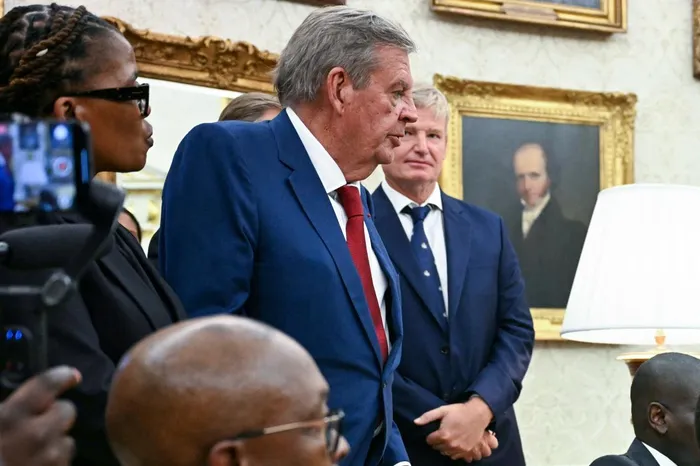Rupert's Starlink nod during Trump meeting reeks of the shadow state capture politics

'PATRIOT' Johann Rupert at the White House
Image: ARP
In the often murky waters of international diplomacy, billionaire Johann Rupert’s involvement in President Cyril Ramaphosa's engagement with Donald Trump may seem like a footnote.
One of South Africa’s wealthiest businessmen, with international standing, merely helping his country during a diplomatic bind.
But considering economic justice, democratic accountability, and historical context, Rupert’s actions raise serious questions about the nature of power in post-apartheid South Africa. His behind-the-scenes influence, particularly in moments of high political tension, is not merely a sign of elite access. It is state capture by any other name.
To grasp the significance of Rupert’s role, we must revisit August 2018.
At the time, Trump tweeted about the so-called "large-scale killing of farmers" in South Africa, a claim rooted in far-right conspiracy theories and white nationalist dog whistles. The South African government immediately rejected this narrative, pointing out that it distorted facts and inflamed racial tensions. At the time, the public didn’t know that Rupert, one of the most influential businessmen, was quietly working the back channels, reportedly engaging with figures in Trump's orbit to mitigate potential diplomatic fallout.
At face value, some might interpret this as patriotism: a concerned, influential citizen leveraging his international networks to rescue the Rainbow Nation.
But this interpretation is dangerously naive. Though unelected and unofficial, Rupert's actions had tangible effects on foreign relations. This is not a benign influence; it is a privatised form of diplomacy carried out without the consent or scrutiny of Parliament or South Africans. In a democracy still grappling with the scars of colonialism and apartheid, this is deeply problematic.
During the meeting, Rupert explained how the so-called white genocide was actually a broader crime pandemic experienced by all South Africans. Then, he masterfully revealed his hand and proffered a solution. He endorsed billionaire oddball Elon Musk's satellite internet enterprise, Starlink, saying the technology should be used in police stations.
But Starlink, like any potential business in the telecommunications sector here, would be expected to follow the relevant regulatory requirements and licensing procedures.
We must name this for what it is: a slick form of state capture. Not the crude, transactional kind we associate with the Gupta era, but a more subtle, insidious version. Rupert does not need to install ministers or siphon public funds to shape the national trajectory. His access, influence, and resources allow him to operate in a parallel sphere of power. One where decisions with national and even global implications are made in private rooms, far from democratic oversight.
This is especially galling given Rupert’s economic positioning. As the heir to an empire built on monopolistic control and apartheid-era advantage, he represents a continuity of privilege that most South Africans will never know. His role in the Trump affair underscores how entrenched interests still define the boundaries of South Africa’s politics.
When elites like Rupert step in to “help,” they are not doing so out of altruism; they are safeguarding a status quo that has long worked in their favour.
Leftist political parties have often warned of Rupert's proximity to Ramaphosa, going as far as calling him out for being the president's puppeteer.
So Rupert’s presence at the White House should come as no surprise.
Democracy is not just about voting every five years. It’s about who has the power to influence outcomes between elections. If billionaires can hijack diplomacy, our institutions will not serve the people. They are serving power.
That brings us to a broader, more urgent question: Who speaks for South Africa? Is it the elected government accountable to its citizens, or is it those with the means to bypass institutions and whisper in the ears of global strongmen? The idea that Rupert could shape perceptions of South Africa within the Trump administration without any public mandate undermines the very notion of people-powered governance.
We cannot ignore the racialised optics either. A white billionaire acting as an intermediary to a U.S. president known for his racist rhetoric invokes South Africa’s colonial past most viscerally. It is an image that cuts to the heart of unresolved tensions in our democracy. Who gets to represent this country on the world stage and who is deemed acceptable to foreign powerbrokers remains a deeply contested issue.
The Ruperts of this world are a symptom of a broader illness: the ongoing fusion of wealth and influence in our democratic institutions. But if we are serious about building a society rooted in equality, transparency, and democratic participation, we must confront this head-on.
Rupert's thinly veiled white saviour performance, masked as diplomacy, was nothing more than an opportunistic display masquerading as altruism.
South Africa has made the mistake of ignoring early signs of state capture. Let us not do so again, especially when dressed in the respectability of “business diplomacy.” It is time to demand accountability from our government and clear boundaries between private capital and public power.
*Peters is managing editor
** The views expressed do not necessarily reflect the views of IOL or Independent Media
Related Topics: